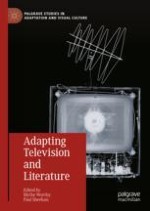2024 | OriginalPaper | Buchkapitel
13. This Is Amerika: Dreaming of Kafka in FX’s Atlanta
verfasst von : Paul Sheehan
Erschienen in: Adapting Television and Literature
Aktivieren Sie unsere intelligente Suche, um passende Fachinhalte oder Patente zu finden.
Wählen Sie Textabschnitte aus um mit Künstlicher Intelligenz passenden Patente zu finden. powered by
Markieren Sie Textabschnitte, um KI-gestützt weitere passende Inhalte zu finden. powered by
